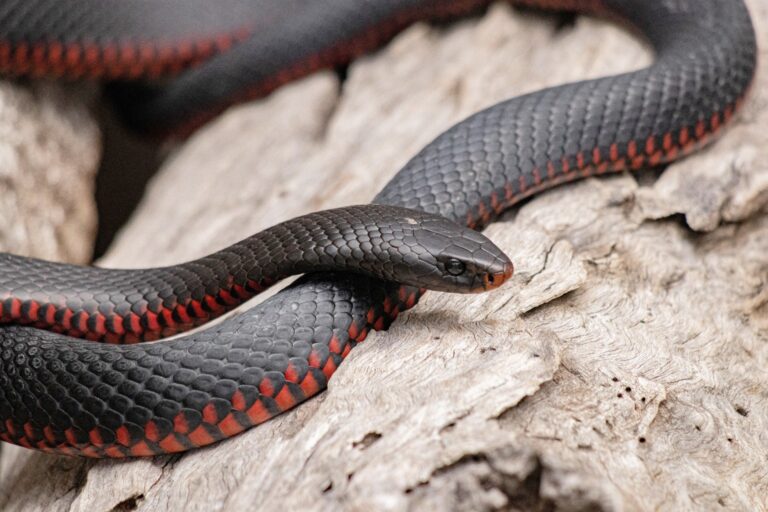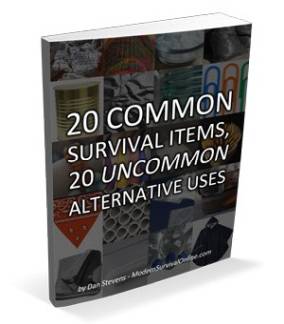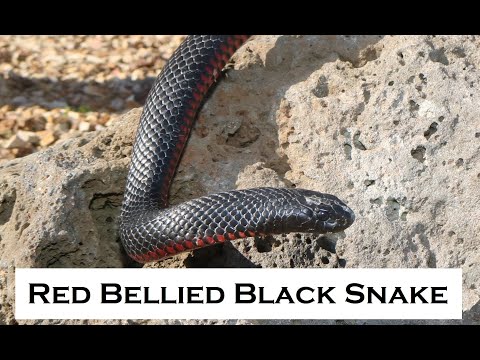If there is one thing you generally don’t want to encounter when out and about in the wilderness, it is a huge and menacing snake.

Be it a monstrous 6-foot rattlesnake or an even more colossal python, these primordial serpents are the stuff of nightmares for many people.
However, most snakes simply don’t get that big, and the vast majority are much smaller.
Some are downright tiny, like the red belly snake. These snakes are so small and elusive it’s easy to miss them completely. But that begs another serious question: are red belly snakes venomous, and are they dangerous to people?
No, red belly snakes are non-venomous, and are harmless to humans and most other animals, including pets and livestock.
Red-belly snakes, despite their tiny size, are fascinating creatures but they are so small that you probably won’t even know they are there, even if you’re standing right next to one.
Don’t let that keep you up at night, as these snakes are so tiny that even if they were to bite you nothing bad would happen.
Even so, keep reading and I’ll tell you everything you need to know about these tiny but vibrant snakes in this article.
What Does the Red Belly Snake Look Like?
Red belly snakes get their common name from their vibrant, boldly colored red bellies. Talk about truth in advertising, eh?
But, their bellies are not always a “true” red color, and can range from a pale, coral orange or salmon color to a bold, “hotrod” red. In any case, you sure won’t miss the belly if you’re looking for it!
But what about the rest of the snake? Their base coloration ranges from a dusty brown or tan to a rich, medium saddle brown color, although regional subspecies may be entirely black or gray with stripes running along the flanks or back being possible in all species.
Also, these snakes are of extremely slight build. They are so thin and wiry, when they are juveniles they might be mistaken for earthworms, and only on the rarest of occasions will adults grow beyond 12 inches (30 cm) in length.
Where are Red Belly Snakes Found?
Red belly snakes typically inhabit moist forests, wetlands, or stands of trees and near human activity in areas that are easy to traverse and burrow in like compost beds and gardens.
Now, this is not to say that red bellies dig their own burrows: they don’t, but they do take over and appropriate the burrows of other animals, including insects.
Pitchfork and stake holes left behind by human activity are some of their favorite places.
Like all predators, which red belly snakes are, they typically stay near the habitat of their chosen prey, and their usual habitat throughout North America and Canada gives us a clue to what they eat, which is mostly slugs, worms and insects.
Are Red Belly Snakes Venomous?
No. The red belly snake is not at all venomous or dangerous to people.
The Australian Red Belly is a Totally Different Snake
Before we go any further, I think it is important to point out just in case any international readers are tuned in…
The snake in North America that is commonly called the red belly (Storeria Occipitomaculata) is an entirely different creature from the snake given the same common name found in Australia, which is indeed venomous.
And of course it is, because it’s in Australia! I swear, the birds there are probably poisonous…
Jokes aside, the Australian red belly (Pseudechis porphyriacus) is much larger than the tiny North American red belly.
These Aussie red bellies are like the bigger, nastier cousins to the North American variety, exceeding 4 feet in length and possessing flame red or orange scales creeping up the sides of the snake and a dark, cherry red belly.
These snakes are quite common and encounters with them are frequent, and though they are venomous, dangerously so, bites are usually survivable.
Again, the North American red-belly snake is non-venomous!
Can the Red Belly Snake Kill Pets or Livestock?
No. Unless you are a worm farmer, the red belly snake cannot harm your livestock or pets. These snakes are so small and so slim they cannot even reliably hurt a newborn chick.
Red bellies subsist on a diet of slugs, snails, worms and tiny insects, not mammals or birds, and not even their eggs.
Will Red Belly Snakes Attack Humans?
No, as a general rule. Red-belly snakes greatly prefer evasion or hiding to confrontation, considering they are pretty much near the bottom of the pecking order when it comes to predation from any animal larger than they are.
If you do manage to catch one, it will probably thrash around briefly before squirting out a nasty anal discharge that is intended to gross you out, and convince you to drop it.
If this doesn’t work they will, somewhat adorably, snarl and expose their itty bitty teeth and even then they will very rarely bite, preferring a threat display to actual violence.
Will a Red-Belly Snake Bite Hurt You?
Let’s just say that, somehow, some way, you were cruel enough to provoke a red-belly snake to bite you. Would it hurt? I suppose it could.
Although non-venomous, red-belly snakes do have sharp teeth, but these teeth are incredibly fine and tiny, designed to grip their equally tiny prey.
If a red belly were to bite you, it could potentially scratch or cut you, but I would say it could do no more than that.
And, red bellies are so unlikely to bite that recorded bites in nature, even when snakes have been caught bare-handed, are almost never recorded.
Is it Best to Kill Red Belly Snakes When You Can?
No, and in fact you shouldn’t! Although they are snakes, and that grosses some people out, red bellies are about as harmless to both humans and animals as imaginable.
A red belly isn’t going to bite you, and even if it did probably nothing would happen. It isn’t going to kill your chickens or your pets. It isn’t going to bother you at all.
And although red bellies are among the least impressive snakes, like all of their larger kin, they play their own important role in the ecosystem, and should be respected and not killed out of hand.
But let’s just say that, somehow, some way, a red belly is terrorizing you or your animals. You don’t need to kill it to get rid of it.
The snake should flee from you at the first sign of your approach, and even if it doesn’t, you can just scoop it up into a convenient bucket and carry it elsewhere. It would probably be glad for the lift and you’ll never see it again…
 Like what you read?
Like what you read?
Then you’re gonna love my free PDF, 20 common survival items, 20 uncommon survival uses for each. That’s 400 total uses for these dirt-cheap little items!
Just enter your primary e-mail below to get your link:
We will not spam you.



 Watch this video on YouTube
Watch this video on YouTube Watch this video on YouTube
Watch this video on YouTube